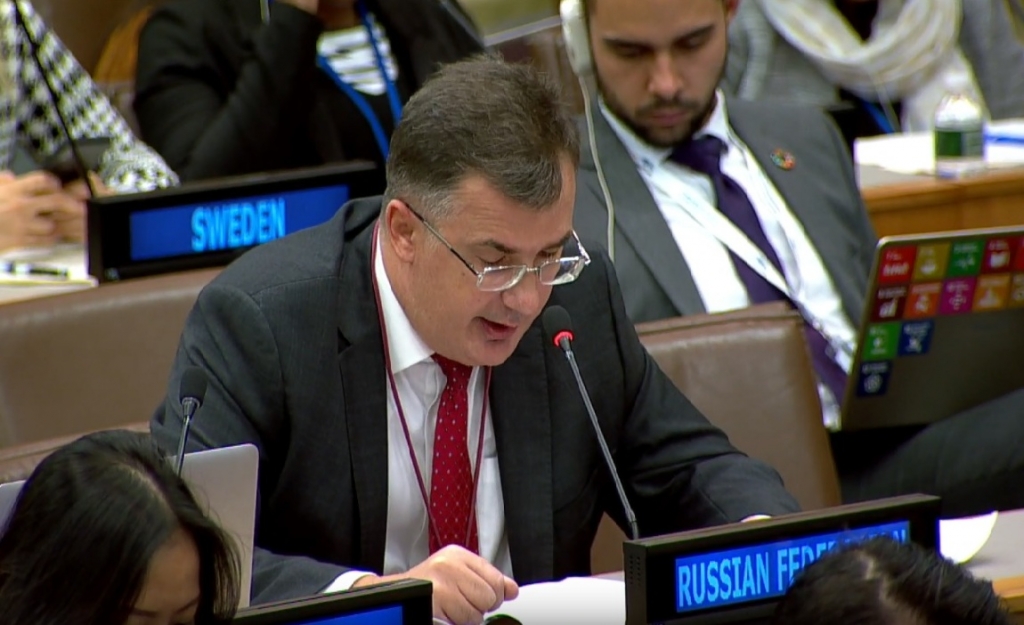Statement by Deputy Permanent Representative Gennady Kuzmin at the Third Committee of the UN General Assembly on agenda item "Countering the use of information and communications technologies for criminal purposes"
Mr. President,
Distinguished colleagues,
Let me congratulate everyone on the start of a broad political discussion at the Third Committee of the UN General Assembly on countering use of information and communications technologies (ICT) for criminal purposes.
We are glad that this pressing topic has attracted much interest of the international community. We would like to thank the Secretary-General of the United Nations for preparing a report under resolution 73/178, that brought together responses by 61 Member States. They outline a whole package of problems that emerge when addressing the use of information and communications technologies for criminal purposes. The majority of States directly stated that the main difficulty was bound to the fact that either the data that constitutes evidence is in a foreign jurisdiction; or the crime itself is committed from abroad. Member States point out that differences in criminal and procedural legislations of various countries create extra complications for interaction of law enforcement authorities. Traditional mechanisms of cooperation, such as legal assistance, are not always effective, i.a. because of their slow pace.
These difficulties build a favorable environment for growth of crime in ICT area that yearly inflicts a huge damage worth trillions USD on global economy. By UN estimates, in 2018 the damage stood at 1.5 trillion USD.
Cybercrime, including theft of information on the web and hacking, is turning into an industry with turnover worth trillions USD. Terrorist groups and criminal organizations make active use of shadow web that gives them access to black markets of drug, arms and criminal data. No country of the world, now matter how advanced its technological development might be, can counter these threats alone.
The existing regional criminal law mechanisms make large contributions to combatting cybercrime, yet they do not cope with it as much as is needed. There are several reasons for that. First, only a limited number of States take part in these mechanisms. Second, these mechanisms are often incompatible with each other. This shows itself when investigating trans-border crimes in the area of ICT. Such mechanisms rest upon regional specifics and, unfortunately, cannot build a fundament for global interaction.
Therefore, despite the scale of the problem, the global community has no solid international legal basis for cooperation, neither has it a common language – the issue that the Secretary-General addressed in his report. As a result, cybersecurity expenditures grow both in private and public sectors. In 2018 alone, they stood at about 124 bn USD.
Our main goal is to devise common rules in this area under UN auspices, that should be simple and clear, account for the objective reality of all countries, and base on principles of sovereign equality of States and non-interference in domestic affairs.
We are convinced that all UN Member States, as well as specialized organizations and mechanisms, such as Interpol, ITU, UNODC should engage in developing such approaches. It is crucial to account for all expertise we have accumulated: through regional cooperation, and through Vienna Intergovernmental Expert Group on Cybercrime that has completed a great body of work at this track.
Last year the majority of countries voted in favor of Russian draft resolution designed to counter cybercrime. Thanks to this decision, we have received another opportunity to have a target discussion of threats that States are facing.
In our view, it is essential to move towards making legally binding agreements on all aspects of countering cybercrime. In this regard, Russia prepared a project that should help us achieve this, that is based on last year’s resolution and the tested language.
We call upon Member States to support this initiative and become its co-authors. We are convinced that we can come up with compromise and mutually beneficial solutions only when acting collectively.
Thank you.
